
The nationwide kidney care provider has expanded its Collaborative Community Kidney Health Program (CCKHP) with the YMCA in 7 U.S. cities, including Los Angeles. (Photo by DaVita.)
The number of kidney failure diagnoses has been growing by five to seven percent each year. While kidney disease is preventable with proper awareness and education, DaVita and the YMCA have joined forces to promote kidney health initiatives through the Collaborative Community Kidney Health Program (CCKHP) in order to support Latino communities across Los Angeles.
The health program will be implemented in six other YMCA locations nationwide with the goal of raising awareness about chronic kidney disease risk factors, offering chronic disease screenings and connecting at-risk individuals with vital kidney health education and resources that they may need.
For 25 years, DaVita has been a health care provider whose main focus has been transforming care delivery for patients globally. As of December 31, 2024, DaVita served approximately 281,100 patients at 3,166 outpatient dialysis centers, of which 2,657 centers were located in the United States and 509 centers were located in 13 other countries worldwide.
Danelle Radney, director of clinical strategy for DaVita, emphasized the importance of early detection within the Latino community. She highlighted that 90% of those with kidney disease are unaware, making it a “silent epidemic.”
She also pointed out barriers that can prevent an individual from needing a transplant or dialysis, such as lack of access to healthcare, missed opportunities for preventive care and the absence of necessary screenings and education that could help prevent chronic diseases.

Danelle Radney, director of clinical strategy for DaVita. (Photo by Steve Smith.)
“Patients in these communities are not getting access to the early intervention that's needed,” Radney said. “Knowledge is power. That's why we're doing this through access to health resources, health screenings and education to the community so that we're able to empower them to make proactive decisions with their physician about their health. And that's really what's most important.”
She also shared that within the Latino community, when there's an individual who has kidney failure, it doesn't just impact them; it impacts every person around them. “In the Latino communities, this burden often falls on the younger family member, and so it’s really important to get that early education and access to screening at a point where there can be intervention,” she said.
Within the Latino community specifically, there is a significant gap between the number of Latinos in need of lifesaving organ transplants and the number of Latino organ donors. In 2020, the number of organ transplants performed on Latinos was about 30% of the number of Latinos currently waiting for a transplant, according to the U.S. Department of Health and Human Services Office of Minority Health.
According to the National Kidney Foundation (NKF), Latinos have a higher chance of experiencing kidney failure compared to white individuals. Latinos are also at higher risk of developing diabetes and high blood pressure, which are the leading causes of kidney failure.

Screening events at YMCA'S. (Photo courtesy of DaVita.)
Jimmy Ozaeta, senior vice president of Mission Advancement at YMCA of Metropolitan Los Angeles, also believes that early detection of kidney disease is critical because of the common barriers that the Latino community often experiences. “That's why treating kidney disease in the early stages is so important because it can slow the progression and prevent patients from actually developing kidney failure, needing a transplant or dialysis, because they were able to detect it early enough,” Ozaeta said.
The NKF recommends that individuals protect their kidney health by understanding the risk factors of diabetes and high blood pressure. Being aware of their family history and getting tested for inherited genetic diseases is also essential for early detection. Furthermore, regular checkups, exercise and a healthier diet are important for maintaining kidney health.
Radney told CALÓ News that CCKHP is crucial for the Latino communities in East L.A. and South Central Los Angeles “We know we cannot achieve a healthier tomorrow for the Los Angeles community or other communities unless we really work together collaboratively,” Radney said. “When we are providing that access to quality healthcare, or access to quality healthcare, it really shouldn't be a luxury; it should be available in every community, in Los Angeles and beyond. That's why DaVita and YMCA have partnered together to collaborate and really raise awareness of kidney health in the highest-risk communities.”
A few other collaborations that DaVita has developed to support greater access to healthcare include the Food is Medicine Coalition, the American Diabetes Association, the American Heart Association and the National Kidney Foundation.
For more than 175 years, the YMCA has been committed to serving everyone, no matter who they are or where they’re from. The nonprofit’s goal is to improve overall health and well-being and ignite youth empowerment across communities nationwide. CCKHP will be piloted at the Weingart East L.A. YMCA and it will also be piloted at the Weingart Wellness and Aquatic Center, which is located in South Central L.A. "This program is tapping into our Latino and Black communities; we are piloting this program at two of our centers and we hope to expand these efforts in the future.” Ozaeta said.

Jimmy Ozaeta, senior vice president of Mission Advancement at YMCA of Metropolitan Los Angeles. (Photo courtesy of Jimmy Ozaeta.)
Health insurance programs like Medi-Cal, which receives one-third of its funding from the federal government, could be affected by the Trump Administration’s proposed budget cuts, which could affect 15 million Californians, including seniors, people with long-term illnesses and disabilities, children and working families who rely on these programs for essential health services. While the specifics of the health care cuts are uncertain, drastic funding reductions may cause millions of Americans to lose access to healthcare, long-term care and specialized benefits.
Ozaeta said that now more than ever it is important to advocate for programs like CCKHP. “I think we're starting to magnify the importance of creating access to high-quality healthcare for our communities of color. It helps us address the need for food insecurity that exists in our communities. And not only that, but also around health education,” he said. “The preventative component is directly connected to education; that's how we can continue to educate our communities around healthy choices. It’s a long journey with the community that we're willing to take and that we're invested in.”
The YMCA will collaborate with DaVita and other public health organizations to provide flexible kidney health education resources, allowing each location to tailor activities based on community needs and capacity. Over the next two years, they will also host screening events to increase maximum community reach. Additionally, each participating YMCA location will offer resources and referrals to their programs, such as the YMCA's Blood Pressure Self-Monitoring Program and YMCA's Diabetes Prevention Program and connect screening participants to health support services.

Pilot Collaborative Community Kidney Health Program screening that took place in May 2024. (Photo courtesy of DaVita.)
The organization's overall goal is to make the most of every interaction with each Angeleno, ensuring they provide a comprehensive approach, as many individuals exposed to the program may be engaging with the YMCA for the first time.
The mission of the YMCA of Metropolitan Los Angeles is to serve as the Center for Community Well-Being, as a holistic ecosystem dedicated to improving the health outcomes of every individual. "Our 28 centers stretch across over 100 miles of Los Angeles County, from Antelope Valley to San Pedro. We are committed to our comprehensive approach dedicated to addressing key social determinants of health of all people throughout the LA Region,” affirmed Ozaeta

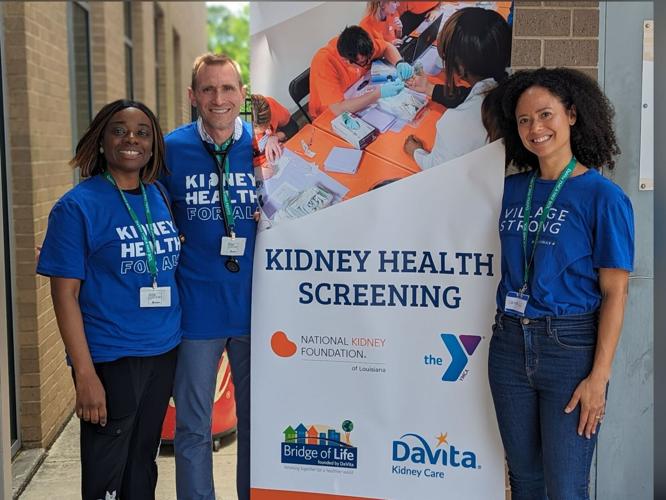
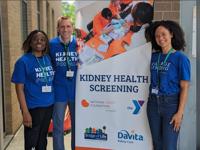



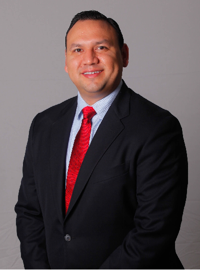

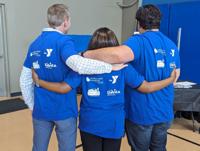

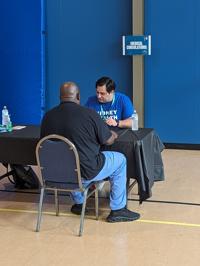



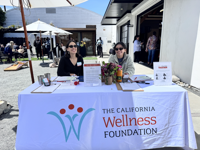

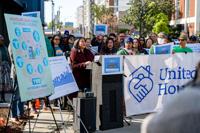


(0) comments
Welcome to the discussion.
Log In
Keep it Clean. Please avoid obscene, vulgar, lewd, racist or sexually-oriented language.
PLEASE TURN OFF YOUR CAPS LOCK.
Don't Threaten. Threats of harming another person will not be tolerated.
Be Truthful. Don't knowingly lie about anyone or anything.
Be Nice. No racism, sexism or any sort of -ism that is degrading to another person.
Be Proactive. Use the 'Report' link on each comment to let us know of abusive posts.
Share with Us. We'd love to hear eyewitness accounts, the history behind an article.